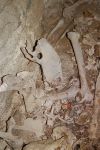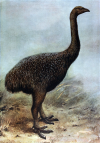News

Recreating ancient ecologies at South Canterbury rock art site
27 Apr 2022
Ngāi Tahu Te Rūnanga o Arowhenua are making great progress restoring the ecological values surrounding the Māori rock art sites at Ōpihi, South Canterbury.

Ecological baselines for Ngāi Tahu Māori Rock Art Trust
14 Apr 2021
A new collaborative research project with Ngāi Tahu Māori Rock Art Trust aims to enable Ngāi Tahu Te Rūnanga o Arowhenua to promote, manage and restore the ecological values surrounding Māori rock art sites at Ōpihi, South Canterbury

Moa and deer
06 May 2019
By using pollen analysis of moa coprolites and deer dung from the same patch of native forest we directly compared the ecological effects of these two large herbivores for the first time.

Return of the lost birds
05 Nov 2018
A new article in New Zealand Geographic details work being undertaken on some of New Zealand's lesser-known extinct birds

Three-quarters of the world’s honeys contain bee-killing neonicotinoid pesticides, according to new global study
11 Oct 2017
Highest concentrations of neonics found in honeys from North America, Asia and Europe.

The penguin that never was
17 Aug 2017
Tess' study on the 'extinct' Tasmanian penguin that never even existed

NZ scientists leading de-extinction discussion
08 Aug 2017
We have contributed to a special issue of Functional Ecology that considers the feasibility and implications of resurrecting extinct species.

Chickens arrived in New Zealand with Captain Cook
22 Aug 2016
Two bones excavated from Maori sites pre-date regular European visits to New Zealand, but overlap with the arrival of James Cook's second voyage from 1773.

Small wetlands critical for safeguarding rare and threatened plants
27 Nov 2014
Rare and threatened species are a common focus of natural area protection but selecting sites to protect them must be balanced against other conservation objectives.

South Island forests burnt within decades of human arrival
27 Nov 2014
Deforestation took place within decades after initial human arrival in the drier parts of New Zealand.

New study reveals timing for rapid and widespread extinction of New Zealand's moa
24 Oct 2014
New modelling of radiocarbon dates provides the clearest insights yet into how and when New Zealand’s iconic giant birds became extinct.

New species of parrot described from the Chatham Islands
01 Sep 2014
New Zealand officially has a new species of bird; unfortunately birdwatchers are unlikely to have much luck if they go looking for it, as it has already been extinct for several hundred years.

Workshop: 'Integrating past and present ecologies' Feb 2014
07 Jan 2014
Landcare Research and the Centre for Biodiversity and Biosecurity at Auckland University provided funding to support a workshop entitled ‘Integrating past and present ecologies in island ecosystems'.

Janet Wilmshurst receives 2013 Te Tohu Taiao award for ecological excellence
28 Nov 2013
Janet was awarded the prestigious 2013 Te Tohu Taiao Award from the NZ Ecological Society.

Vegetation history of Tawhiti Rahi, Northland, helps to inform management of degraded offshore islands
25 Sep 2013
Conservation palaeoecology is increasingly being recognised as a tool that can help to inform both restoration and conservation of island reserves by providing prehuman vegetation baselines.

New research suggests gut parasites may have gone extinct alongside moa
28 Feb 2013
The study, published in the online open-access journal PLOS ONE (http://dx.plos.org/10.1371/journal.pone.0057315) found evidence that moa were parasitised by a range of nematodes, trematodes, and apicomplexans (a group of unicellular microorganisms).

Analysis of fossil kakapo dung shows kakapo dined on the parasitic plant Dactylanthus taylorii
02 Oct 2012
Fossilised bird dung from a cave in the northwest corner of New Zealand's South Island has provided new insights into the lives of two of the country’s most threatened species, a flightless endemic parrot and a plant root parasite.

Study of coprolites offers new insights into the lives of subalpine moa (Megalapteryx)
02 Jul 2012
New research has cast light on the diet of moa in subalpine environments and provided clues to the changing face of New Zealand’s ecology.

Landcare Research celebrates Marsden Fund success
06 Oct 2011
Janet Wilmshurst has been awarded a grant to resolve a significant chapter of New Zealand’s prehistory by providing a precise age for Moriori settlement on the Chatham islands.

Early settlers rapidly transformed lowland forests with fire
14 Dec 2010
New research indicates that the speed of early forest clearance following human colonisation of the South Island of New Zealand was much faster and more intense than previously thought.

Colonisation of East Polynesia more recent and rapid than previously proposed
28 Oct 2010
New research shows early human colonisation of East Polynesia was much faster and more recent than previously proposed, providing a robust new timing and sequence for the colonisation of the region.


